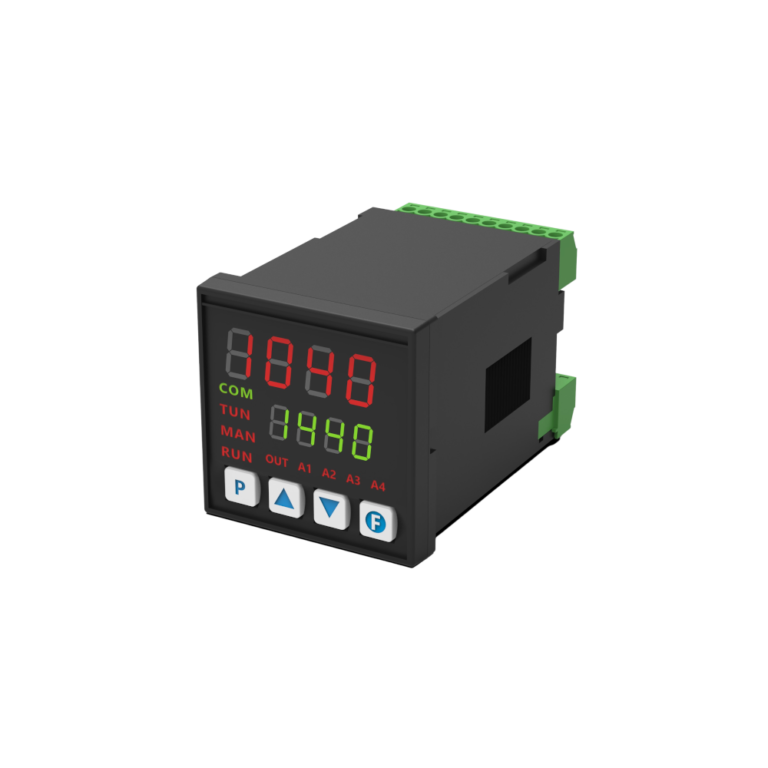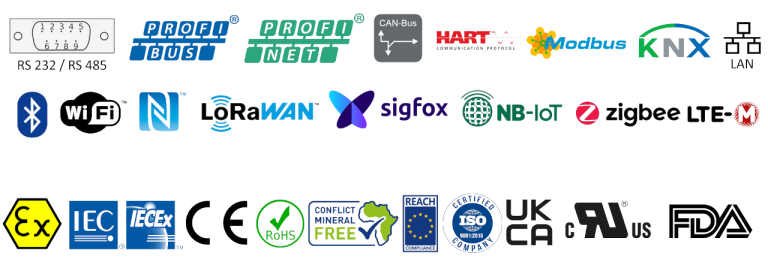PID controllers
- Allmetra AG
- Accessories & Components
- PID controllers
In many production processes, precisely regulated temperatures are of the greatest importance. This requires reliable controllers that take the input signal from a temperature sensor, compare it with a setpoint, and in the event of deviations, send an output signal to a control element. Our portfolio includes temperature controllers with high-performance PID algorithms and compact housings with timers and relay options for a wide variety of processes.
Models:
- Auto-adaptive PID controller
- PID controller with LCD display
- Time and temperature controller
- Temperature controller with timer
Specifications:
Inputs / outputs and interfaces:
- 0… 20 mA
- 4… 20 mA (preferred)
- 0… 10 V
- 5 Vdc logistician output
- Alarm
- RS485
- Relay
Areas of application:
- Environmental and food technology
- Automobile
- Water and sewage
- Chemicals, oil & gas
- Textiles
- Energy
- Agriculture
- Mining
Various types of controllers are used for temperature control:
- Two- and three-point controllers
- Proportional controllers (P controllers)
- Integral controllers (I controllers)
- Proportional-integral controllers (PI controllers)
- Differential controllers (D controllers)
- PID controllers
Two-point controllers only supply the output states: “On” and “Off”; three-point controllers supply three states: “Heating”, “Cooling” and “Off”. Both variants have the disadvantage that they can only keep temperatures within a specified range of values, but not at an exact target value. This requires constant controllers, which include proportional, integral and differential controllers, as well as various combinations of these types.
Proportional controllers ensure that the actual value quickly approaches the setpoint. The controller output variable is proportional to the control difference. If this is large, the output signal of the controller is also large in order to compensate for the difference as quickly as possible. The disadvantage of the P controller is continuous control deviation from the setpoint.
The integral controller compensates for the continuous control deviation by including it in the calculation of its output value over a defined period of time. It is the only control element that can completely eliminate setpoint deviations, but it pays for its accuracy with a certain amount of inertia.
Proportional-integral controllers combine P and I controllers. They can quickly compensate for large differences between the actual and setpoint values, and maintain the latter without continuous control deviation. However, if there is a sudden control deviation, they react relatively slowly. Their control behavior is sluggish, especially in the case of small deviations.
D controllers are only available in conjunction with P or I controllers. The differential algorithm ensures that even small deviations are quickly compensated for. This balances out the sluggish control behavior of the proportional or integral controller and thereby increases the control speed.
The PID controller integrates the algorithms of P, I and D controllers, enabling a rapid response to large and small control differences. It can be connected in a series or parallel structure. The characteristics of the P, I and D components can be optimally matched to the controlled system via suitable parameterization.
Our PID controller is easy to install even where space is limited, thanks to its compact size and removable plug. The terminal block, which is also removable, simplifies both installation and maintenance. To protect against water jets, the controller is equipped with protection class IP65. At the same time, the UL94 V-2 flame retardant housing ensures perfect flame protection in heat-exposed areas. With its powerful PID algorithm, it is ideally suited for use in mechanical and plant engineering, as well as for many other industries.
The extended configuration of all parameters and any fine-tuning can be implemented quickly and easily via the USB connection using the free configuration software.
The PID controller is suitable not only for the temperature sensors we produce. You can use it easily in conjunction with your Pt100 sensors and type J, K and T thermocouples from other manufacturers. Do you need a tailor-made solution? We can also help you with this. Contact us today and benefit from our closeness to our customers through our global sales network, and our short delivery times through our fast worldwide airfreight services.
Allmetra’s measurement chain
Products & Production
During our decades of experience, we have found the perfect balance between in-house production and using our partners’ plants. Always with the aim of delighting our customers with the best possible solutions.
Accessories & Components
We have built true partnerships with our suppliers through our many years of doing business together. We only work with quality-conscious, highly qualified suppliers.
Services & Solutions
We keep an eye constantly on the future, which we see filled with expert advice, technical support, and developments ranging from a wide array of sensors up to customized IoT / IIoT software solutions.





